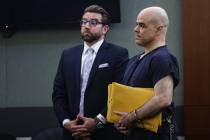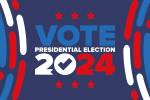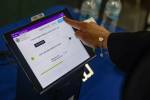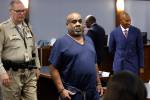Nevada high court justices hear appeal in ACORN case
The Nevada Supreme Court is expected to rule soon on whether to let stand or tear down the law used to prosecute the defunct community organizing group ACORN.
On Thursday three justices - Michael Douglas, Mark Gibbons, and Ron Parraguirre - grilled a prosecutor and defense attorney as they argued over whether the law used in the criminal case breaches free speech protections.
Lawyers from the high-powered firm Jones Vargas have argued the state law that makes it illegal "for a person to provide compensation for registering voters that is based upon the total number of voters a person registers" is vague and violates the First Amendment.
But prosecutors have said that the state has a "compelling interest in protecting the integrity of the voter registration process" and that compensation programs have led to voter fraud in the past.
The appeal in the ACORN case comes from defendant Amy Busefink, who in November 2010 struck a deal and pleaded no contest to two misdemeanor counts of conspiracy. She was sentenced to a year of probation, ordered to pay a $4,000 fine and perform 100 hours of community service. As part of the deal she was allowed to challenge the law.
State prosecutors said ACORN, the Association of Community Organizations for Reform Now, and Busefink authorized a Las Vegas field operative to run an illegal voter-registration program during the 2008 election cycle that paid cash to encourage canvassers to sign up voters.
About $65 in bonuses was paid out.
Busefink's lead appeal lawyer, Bradley Schrager, told the justices, "This is not a voter fraud case, but I understand why it is described as such. No politician or public official over the last five years in this country has lost points for raising the fear of voter fraud."
But prosecutor Robert Wieland argued that this type of compensation program led to or encouraged voter fraud.
Schrager said there are other state laws that make it illegal to falsify voter registration applications. And the false applications that led to the investigation into ACORN did not come from ACORN workers.
Schrager questioned whether there was even a need for the law.
Douglas questioned whether the community was harmed by having the incentive program because the result was registering people to vote, not a tragic catastrophe.
The law dates to 1993. The ACORN case was the first time it was used to prosecute anyone.
In August, ACORN was fined $5,000 after it pleaded guilty to one count of felony compensation for registration of voters. But when the national organization closed its doors in April 2010, the group had assets totaling less than $4,000 and $4 million in liabilities.
The field operative who created and ran the incentive program, Christopher Edwards, was sentenced to three years of probation after pleading guilty to two misdemeanors.
Busefink, who oversaw Edwards, is a longtime employee of Project Vote, a national grass-roots organization that registers voters and worked with ACORN in 2008.
ACORN officials maintained that Edwards was ordered not to run the incentive program.
The program, called Blackjack or 21-Plus, rewarded workers with $5 extra per shift if they brought in 21 or more completed voter registration cards.
Prosecutors never charged anyone with turning in a fraudulent form.
Contact reporter Francis McCabe at fmccabe@review
journal.com or 702-380-1039.























